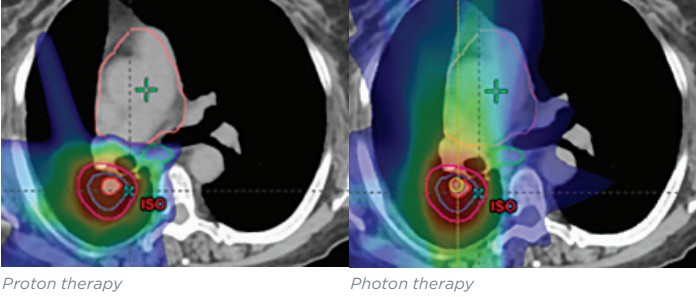Proton Therapy for Lung Cancer
Target lung cancer while sparing surrounding lung and heart tissue
Proton therapy is a highly targeted form of radiation therapy that localizes the radiation exposure to the tumor with reduced excess radiation affecting the lung, heart or esophageal tissues around it.

Why choose proton therapy?
Treating tumors in the lungs is often made more difficult by having to be aware of the sensitive tissue in and around the lungs. Traditional X-ray radiation is difficult to apply to lung tumors because it can damage healthy tissue and cause further side effects and complications.
Because of the precision of proton therapy, the risk for side effects to the heart and lungs can often be reduced. Many of our patients experience a higher quality of life throughout their treatment. Recent clinical evidence suggests that lung cancer patients may experience 57 percent less severe lung complications and a 32 percent increase in overall three-year survival rates.
For those with a recurrence of lung cancer, additional radiation therapy can increase the risk of side effects and secondary cancers. In these cases, proton therapy can provide an optimal dose of radiation to your tumor while protecting surrounding areas.
Thoracic/lung cancers we treat with proton therapy
We’re currently able to provide proton therapy for the following lung cancers:
- Malignant mesothelioma
- Mediastinal tumors (thymoma and sarcoma)
- Non-small cell lung cancer
- Small cell lung cancer
- Select recurrent cancer
Proton therapy for recurrent lung cancer
For those with a recurrence of lung cancer, additional radiation therapy can increase the risk of side effects and secondary cancers. In these cases, proton therapy can provide an optimal dose of radiation to your lung tumor while protecting surrounding areas. This puts radiation back on the table as a treatment option for recurrent lung cancer.
Learn more about proton therapy
Request a consultation below to learn if proton therapy might benefit you. Our physicians will work with you and your care team to create your personalized treatment plan.

